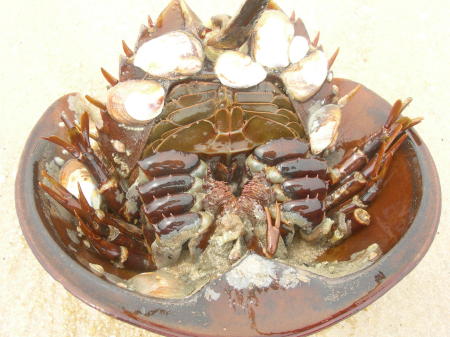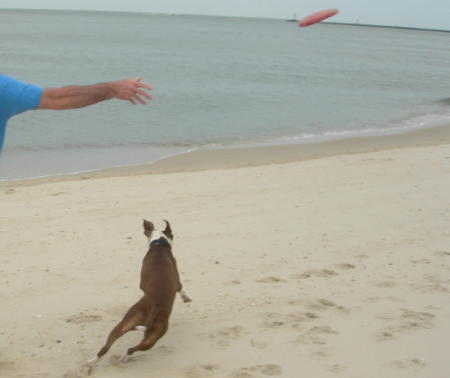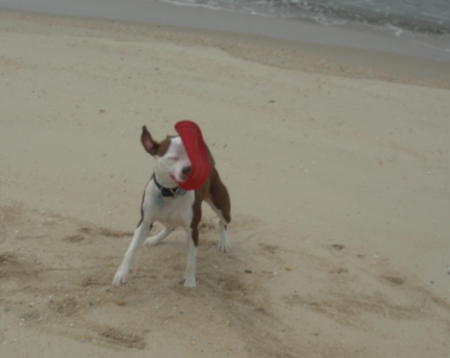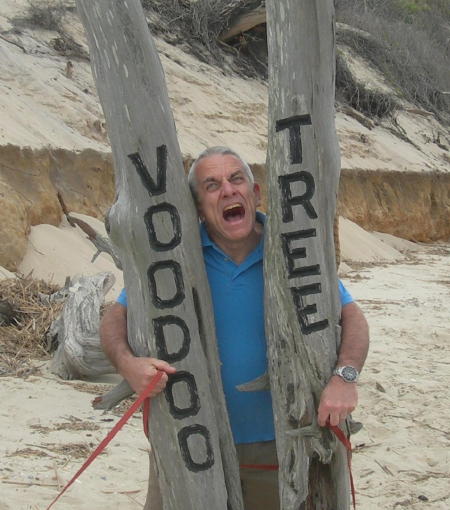





|
|
|
|
May 13, 2007
Fossilizing on the beach?
When I take a day off from blogging, it's much harder to return to it. Taking a day off makes me want to take a week off, and taking a week off makes me want to take two weeks off. So it's better for me to never, ever, take a break from blogging. Because of the lurking, accumulated rest deficit, "resting up" is a dire threat to blogging. Rest equals atrophy, and atrophy leads to fossilization. The truth is that taking any sort of rest activates latent feelings of blogger burnout syndrome which want to break free and take over. The only way I have of preventing blog burnout from developing is to switch into robot writing mode. Doing this means forgetting completely about that impulse to write creatively or think imaginatively, and instead approach writing the way I would approach the unpleasant task of performing 120 pushups. Just do it, and fossilization is avoided.
The horseshoe crab, Limulus polyphemus, is more closely related to chelicerates such as spiders, scorpions, ticks and mites than it is to true crabs and other crustaceans. Horseshoe crabs are considered to be "living fossils" that have evolved little in the past 250 million years. Limulus is an ancient genus which has probably existed since the Silurian period (440 to 410 million years ago), and shows little morphological change from the now extinct genus Paleolimulus that lived about 200 million years ago. Limulus polyphemus is believed to be the closest living relative of trilobites (Shuster 1982).Why they get stranded on beaches is not entirely clear. (I've seen them washed up regularly for years, although I'm sure that children today are taught that it's man's fault.) Right now it's spawning season, and it has been hypothesized that telson (tail) abnormalities may contribute to the problem: Massive beach strandings of adults accompany seasonal spawning migrations of crabs along Cape May in Delaware Bay, (USA). At least 190000 horseshoe crabs, approximating 10% of the adult population, died from beach stranding along the New Jersey shore of Delaware Bay during the 1986 (May to June) spawning season. Abnormalities of the telson (which is used in righting behavior) were significantly more common among stranded crabs than among individuals actively spawning on the intertidal beach.  I took a picture of the one at left as it was being washed up, and while my suspicion was that the large number of mussels might have had something to do with its lack of coordination, I read that such freeloaders are completely normal. Anyway, it seemed unable to right itself, and uninterested in escaping. I put it back into the water, but that seemed like a waste of time. Some of these creatures are just doomed, like the dozens I saw dried up and dead. I took a picture of the one at left as it was being washed up, and while my suspicion was that the large number of mussels might have had something to do with its lack of coordination, I read that such freeloaders are completely normal. Anyway, it seemed unable to right itself, and uninterested in escaping. I put it back into the water, but that seemed like a waste of time. Some of these creatures are just doomed, like the dozens I saw dried up and dead.
But Coco wasn't there to learn about living fossils; her purpose was to force me to play.  Which I did.  The frisbee is made of rubber, and Coco can't resist shaking it. This deceptive photo freezes in time something which normally takes place too fast for me to notice: 

But can't it also be seen as clinging to voodoo in the hope of avoiding fossilization? (Fortunately, Coco dragged me away from what would have been a futile paradox.) posted by Eric on 05.13.07 at 12:47 PM
Comments
Ohhhhhhhh!!!! LOL. I guess I shouldn't have expected a joke about a virgin forest! :) Eric Scheie · May 13, 2007 05:37 PM Looks like your dog just ate the last trilobite on the planet. Bleepless · May 13, 2007 11:50 PM Post a comment
You may use basic HTML for formatting.
|
|
May 2007
WORLD-WIDE CALENDAR
Search the Site
E-mail
Classics To Go
Archives
May 2007
April 2007 March 2007 February 2007 January 2007 December 2006 November 2006 October 2006 September 2006 August 2006 July 2006 June 2006 May 2006 April 2006 March 2006 February 2006 January 2006 December 2005 November 2005 October 2005 September 2005 August 2005 July 2005 June 2005 May 2005 April 2005 March 2005 February 2005 January 2005 December 2004 November 2004 October 2004 September 2004 August 2004 July 2004 June 2004 May 2004 April 2004 March 2004 February 2004 January 2004 December 2003 November 2003 October 2003 September 2003 August 2003 July 2003 June 2003 May 2003 May 2002 AB 1634 See more archives here Old (Blogspot) archives
Recent Entries
• "Internet accounts have exaggerated aspects of the crime"
• more political bad taste • the bellwhether of my karma ran over the influence of my dogma! • Rachel Lucas is back! • Doing nothing beats doing something awful • Questioning the timing of reality • Bio Fuels - Starve The Poor So The Rich Can Feel Good • It Is Uncertain • the relative objectivity of science and religion • Faking out the anti-fake movement
Links
Site Credits
|
|
Thank you for yet another interesting post, Eric. CV is on my daily read list, but I'm not a great commenter. However, coming down to you tree hugging reference, I just cannot help wanting to share with you a story I heard the other day:
""
Tree hugger
A woman from Los Angeles, who was a tree hugger and an anti-hunter, purchased a piece of timberland, near Grants Pass, OR.
There was a large tree on one of the highest points in the tract. She wanted a good view of the natural splendor of her land so she started to climb the big tree. As she neared the top she encountered a spotted owl that attacked her. In her haste to escape, the woman slid down the tree to the ground and got many splinters in her crotch.
In considerable pain, she hurried to the nearest
doctor She told him she was an environmentalist and an anti-hunter and how she came to get all the splinters. The doctor listened to her story with
great patience and then told her to go into the examining room and he would see if he could help
her.
She sat and waited three hours before the doctor
reappeared. The angry woman demanded, "What took you so long?"
He smiled and then told her, "Well, I had to get
permits from the Environmental Protection Agency, the Forest Service and the Bureau of Land
Management before I could remove old-growth timber from a recreational area. I'm sorry, but they turned me down."
""
Padon my being cheeky on a Sunday evening (Oslo time)! And please keep up the good work! Best regards, JD in Oslo.